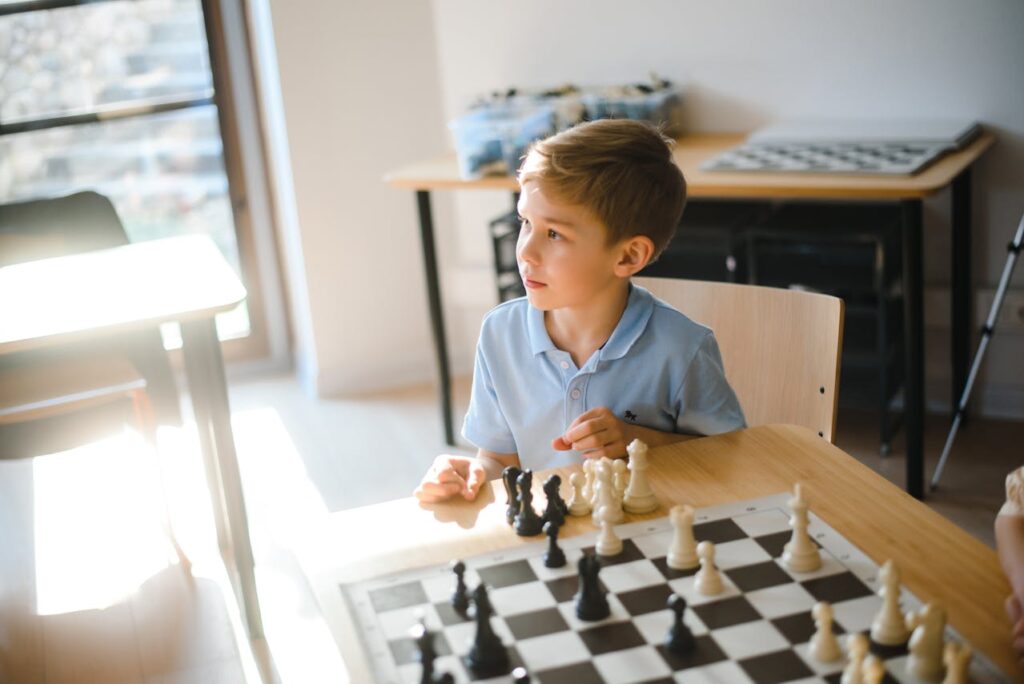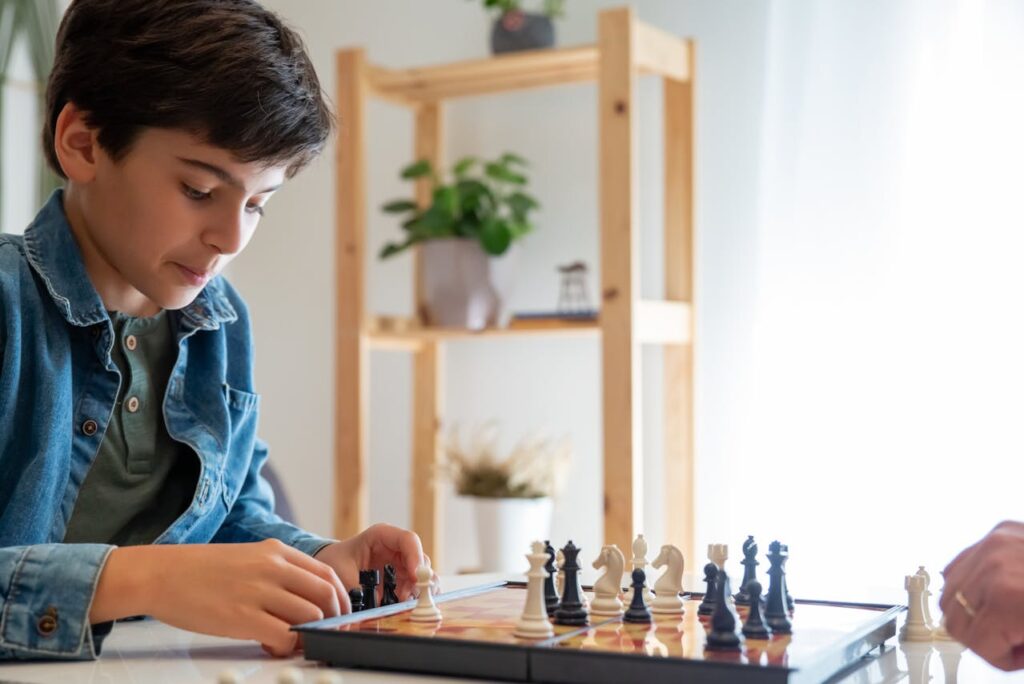Learning disabilities can present significant challenges for children, affecting their ability to keep up in school, interact socially, and build confidence. As a parent or educator, finding effective tools and strategies to help these children thrive is often a top priority. One such tool, though perhaps not as widely recognized as traditional methods, is the game of chess.
Far from being just a pastime, chess is a powerful educational tool that can support children with learning disabilities in unique and impactful ways. In this article, we’ll explore how chess can be used to help children with learning disabilities develop important skills, boost their confidence, and enhance their overall learning experience.
Understanding Learning Disabilities
Before diving into how chess can help, it’s important to understand what learning disabilities are. A learning disability is a neurological condition that affects a person’s ability to process information.
This can manifest in various ways, such as difficulties with reading (dyslexia), writing (dysgraphia), mathematics (dyscalculia), or attention (ADHD).
These challenges are not related to intelligence; children with learning disabilities often have average or above-average intelligence, but they struggle with specific areas of learning due to how their brains process information.

How Chess Supports Cognitive Development
One of the most significant ways chess can help children with learning disabilities is by supporting cognitive development.
Chess is a game that requires concentration, memory, problem-solving, and critical thinking—skills that are often areas of difficulty for children with learning disabilities.
Enhancing Concentration and Focus
Children with attention deficits, such as those with ADHD, often struggle to maintain focus on tasks, especially those that are long or complex.
Chess, with its need for sustained concentration, can help improve this skill.
During a game of chess, children must focus on the board, think about their moves, and anticipate their opponent’s responses.
This requires a level of concentration that, over time, can help improve their ability to focus on other tasks as well.
The structured nature of chess, with its clear rules and objectives, also helps children with attention difficulties by providing a framework within which they can direct their focus.
Improving Memory
Memory is another area where children with learning disabilities often face challenges. Chess is an excellent tool for enhancing both short-term and long-term memory.
Players need to remember the positions of the pieces, the rules of the game, and various strategies.
Over time, this practice can help improve a child’s ability to retain and recall information, which is beneficial not only in chess but in academic settings as well.
For example, a child who struggles with dyslexia might find it difficult to remember the sequence of letters in a word.
Through regular chess practice, where they must remember moves and strategies, they may develop stronger memory skills that help with reading and spelling.
Developing Problem-Solving Skills
Problem-solving is a critical skill for success in both school and life, but it’s an area where many children with learning disabilities struggle.
Chess is inherently a game of problem-solving. Each move presents a new challenge that requires the player to think critically and strategically.
For children with learning disabilities, practicing problem-solving in the context of a game can be less intimidating and more engaging than traditional academic exercises.
They learn to break down complex problems into smaller, more manageable parts, think about different solutions, and evaluate the consequences of each option.
This kind of thinking can then be applied to academic tasks, helping them approach schoolwork with greater confidence and competence.

Encouraging Logical and Sequential Thinking
Children with learning disabilities may find it challenging to think in a logical, sequential way, which is essential for tasks like math and reading comprehension.
Chess requires players to think several moves ahead, anticipate outcomes, and plan a sequence of actions. This practice helps children develop the ability to think in a logical and ordered manner.
For instance, a child with dyscalculia, who struggles with understanding numbers and sequences, can benefit from the structured and sequential nature of chess.
The game requires them to follow a logical progression of moves, helping to reinforce the concept of sequences and improve their ability to think in an orderly way.
Chess as a Social and Emotional Support Tool
Beyond cognitive development, chess offers significant social and emotional benefits, especially for children with learning disabilities.
These children often face challenges in social interactions and may struggle with self-esteem due to difficulties they encounter in traditional learning environments.
Building Social Skills
Children with learning disabilities may find it difficult to interact with peers, often because they feel different or misunderstood.
Chess can serve as a bridge for these children, offering a common ground where they can connect with others.
The game is played one-on-one, which can be less overwhelming than group activities and allows for more focused interactions.
During a chess game, children must communicate with their opponent, whether it’s to discuss the rules, share strategies, or simply engage in friendly conversation.
This interaction helps them practice important social skills such as taking turns, respecting others, and understanding different perspectives.
Boosting Self-Esteem and Confidence
One of the most profound impacts of learning disabilities is on a child’s self-esteem. Struggling with tasks that others find easy can lead to feelings of frustration, failure, and low self-worth.
Chess offers a different experience—one where children can succeed and feel proud of their achievements.
Because chess is a game of strategy rather than speed or memorization, children with learning disabilities can excel in ways they might not in other academic areas.
Success in chess can provide them with a much-needed confidence boost, helping them see that they are capable and intelligent.
Promoting Emotional Regulation
Children with learning disabilities often struggle with emotional regulation, finding it difficult to manage feelings of frustration, anger, or anxiety—especially in response to academic challenges.
Chess, with its emphasis on thinking before acting, can help children learn to regulate their emotions.
In chess, impulsive moves often lead to mistakes. This teaches children the value of patience and careful consideration, encouraging them to pause and think before they act.
Over time, this can help them develop better emotional control, not just in chess, but in other areas of life.
Chess as a Tool for Specific Learning Disabilities
While chess offers broad benefits for all children with learning disabilities, it can also be particularly effective for addressing specific types of learning challenges.
Let’s explore how chess can be tailored to support children with some of the most common learning disabilities.
Chess and Dyslexia
Dyslexia, which primarily affects reading and language processing, can make traditional learning methods frustrating for children.
However, chess doesn’t rely on reading skills, making it an accessible and enjoyable activity for children with dyslexia.
The visual and spatial nature of chess can help children with dyslexia strengthen their visual processing skills.
As they learn to recognize patterns on the chessboard and anticipate moves, they develop their ability to process visual information—skills that are also important for reading and writing.

Chess and ADHD
Attention Deficit Hyperactivity Disorder (ADHD) affects a child’s ability to focus, control impulses, and stay organized—challenges that can make traditional learning environments difficult to navigate.
Chess, with its need for sustained attention and thoughtful planning, offers a way to practice these skills in a structured and engaging setting.
For children with ADHD, chess can help improve focus and reduce impulsive decision-making.
The game’s turn-based nature allows them to practice waiting their turn, thinking carefully about their moves, and considering the consequences of their actions.
Over time, this can help them develop better control over their impulses and improve their ability to focus on tasks for extended periods.
Chess and Dyscalculia
Dyscalculia, which affects a child’s ability to understand numbers and mathematical concepts, can make math a particularly challenging subject.
Chess, however, offers a way to practice numerical and spatial reasoning in a less formal and more enjoyable context.
In chess, players must constantly evaluate the value of pieces, calculate potential moves, and anticipate the outcomes of different strategies.
These activities involve numerical thinking and help children with dyscalculia develop a better understanding of numbers and relationships between them.
How to Introduce Chess to Children with Learning Disabilities
Introducing chess to a child with learning disabilities requires patience, encouragement, and a thoughtful approach.
It’s important to make the experience enjoyable and tailored to their individual needs, so they can reap the full benefits of the game without feeling overwhelmed.
Start with the Basics
When introducing chess to a child with learning disabilities, it’s essential to start with the basics. Begin by familiarizing them with the chessboard, the pieces, and how each piece moves.
Avoid overwhelming them with too much information at once. Instead, focus on one piece at a time, allowing them to practice moving that piece before moving on to the next.
Using physical chess pieces can be particularly helpful for children who struggle with abstract thinking or need a more tactile learning experience.
Encourage them to touch and move the pieces, which can help reinforce their understanding of the game.
Make It Fun and Engaging
For children with learning disabilities, it’s crucial that chess remains a fun and engaging activity.
Avoid turning it into something that feels like a chore or an obligation. Instead, present chess as a game—a chance to play, explore, and experiment.
Consider incorporating storytelling or role-playing elements into the game. For example, you could explain the roles of the different pieces in a way that makes the game feel like an adventure.
The king needs to be protected, the knights are brave warriors, and the pawns are soldiers on the front lines.
This approach can make the game more relatable and enjoyable for children, especially those with vivid imaginations.
It’s also helpful to play short games or even just a few moves at a time, especially at the beginning. This keeps the sessions manageable and prevents the child from becoming overwhelmed or frustrated.
As they become more comfortable and confident, you can gradually extend the length of the games.
Use Positive Reinforcement
Positive reinforcement is key when teaching chess to children with learning disabilities.
Celebrate their successes, no matter how small, and provide encouragement throughout the learning process. This helps build their confidence and reinforces their progress.
For example, if a child successfully remembers how a particular piece moves or makes a thoughtful move during the game, praise them for it.
Let them know that they’re doing well and that you’re proud of their efforts. This kind of encouragement can make a big difference in their willingness to keep trying, even when the game becomes challenging.
It’s also important to frame mistakes as learning opportunities. If they make a move that doesn’t work out, instead of focusing on the mistake, help them analyze what happened and what they might do differently next time.
This approach teaches resilience and helps them develop a growth mindset, which is particularly important for children with learning disabilities.
Adapt the Game to Their Needs
Every child is unique, and what works for one child may not work for another. Be flexible and willing to adapt the game to fit your child’s needs.
For example, if they struggle with remembering the rules, you might keep a simple guide or reference sheet nearby that they can consult during the game.
If they have difficulty with the abstract thinking required in chess, consider using visual aids or playing simplified versions of the game.

For instance, you could start by playing on a smaller board (such as a 4×4 grid) or with fewer pieces. This allows them to focus on mastering the basics before moving on to the full game.
You might also adapt the pace of the game to match your child’s attention span. Some children may benefit from taking breaks during the game to prevent fatigue or loss of focus.
Others might prefer playing faster-paced games that require quick thinking rather than prolonged concentration. The key is to find a rhythm and style of play that keeps your child engaged and motivated.
Integrate Chess into Their Routine
Consistency is important when developing new skills, so try to integrate chess into your child’s regular routine.
This doesn’t mean forcing them to play every day, but rather finding a schedule that works for them—whether it’s a weekly game night with the family or short sessions after school.
Creating a routine helps normalize chess as part of their day-to-day life, which can make it easier for them to practice and improve.
It also helps them see chess as a regular activity, rather than something special that they only do occasionally.
If your child enjoys playing chess, consider enrolling them in a local chess club or online chess community where they can interact with other players.
These social interactions can provide additional motivation and support, as well as opportunities to learn from others and share their progress.
The Role of Parents and Educators in Supporting Chess Learning
The support and involvement of parents and educators are crucial in helping children with learning disabilities succeed in chess. Here’s how you can play an active role in their chess journey.
Be Patient and Encouraging
Learning chess can be challenging, especially for children with learning disabilities. As a parent or educator, your patience and encouragement are vital.
Understand that progress may be slow, and there will be ups and downs along the way. Celebrate the small victories and be there to support them when they encounter difficulties.
Encouraging a positive attitude towards chess is also important. If the child enjoys the game and feels good about their progress, they’re more likely to stick with it and continue improving.
Avoid putting pressure on them to win or perform at a certain level; instead, focus on the joy of playing and the learning that comes with each game.
Collaborate with Educators and Specialists
If your child is in school or working with a specialist, consider collaborating with their educators to incorporate chess into their learning plan.
Many schools and therapy programs are open to using chess as a tool for cognitive and social development.
Discuss with teachers or learning specialists how chess might complement other interventions or educational strategies.
For example, a teacher might use chess to reinforce concepts learned in the classroom, or a therapist might use chess as part of a social skills group.
By working together, you can create a more comprehensive and supportive learning environment for your child.

Use Chess as a Tool for Broader Learning
Chess can be used as a springboard for broader learning and development.
For example, after a chess game, you might discuss with your child how the strategies they used in the game could apply to their schoolwork or daily life.
This helps them make connections between the skills they’re developing in chess and other areas of learning.
You can also use chess to introduce new concepts or reinforce existing knowledge. For instance, you might explore the history of chess, discussing how the game has evolved over time and its significance in different cultures.
This not only deepens their understanding of the game but also broadens their knowledge and curiosity about the world.
Conclusion
For children with learning disabilities, finding tools and strategies that support their development can be life-changing.
Chess is one such tool that offers a unique combination of cognitive, social, and emotional benefits.
By helping children improve their concentration, memory, problem-solving skills, and emotional regulation, chess can play a crucial role in their overall learning journey.
Moreover, chess provides a supportive and engaging environment where children can build confidence, develop social skills, and experience the joy of learning through play.
Whether used as a standalone activity or integrated into a broader educational plan, chess has the potential to make a significant and lasting impact on the lives of children with learning disabilities.
READ NEXT:
- Strategic Thinking for Kids: Why Chess Helps
- How Chess Can Help Your Child Excel in School
- Competitive Chess: Building a Growth Mindset
- Chess for ADHD: Helping Kids Focus
- Chess vs. Video Games: Which Wins for Brainpower?
- Social Skills Through Chess: Why It Works
- Math and Chess: A Perfect Match for Kids

